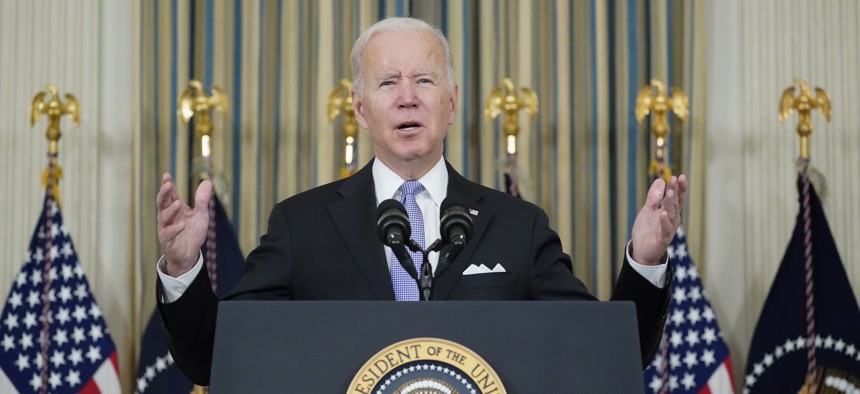House Passes ‘Long Overdue’ Infrastructure Package

President Joe Biden speaks about the bipartisan infrastructure bill in the State Dinning Room of the White House, Saturday, Nov. 6, 2021, in Washington. AP Photo/Alex Brandon
President Biden and local government leaders hailed Congress’ approval of the $1.2 trillion infrastructure bill, which will provide funding for roads, bridges, transit, broadband and water projects across the country.
It’s finally “Infrastructure Week.”
The House approved the roughly $1 trillion infrastructure package late Friday following months of intraparty discord among Democrats, sending a bill that will fund state and local highway, transit, water and broadband projects across the country.
President Biden hailed the bill’s passage as a “monumental step forward for the nation” that will create millions of jobs, modernize aging infrastructure, address the climate crisis and make the United States more competitive in the global economy.
Approved by a bipartisan group of senators over the summer, the legislation will cost $1.2 trillion—reauthorizing existing federal infrastructure programs for five years and approving $550 billion in new spending. The package includes $110 billion for roads and bridges, $39 billion for public transit, $65 billion for broadband, $55 billion for water systems, $65 billion for power grid systems, $7.5 billion for a national network of electric vehicle charging stations.
“Infrastructure Week, I’m so happy to say that,” Biden said during remarks on the passage of the legislation Saturday morning. “We did something long overdue, that long has been talked about in Washington, but never actually done.”
The term Infrastructure Week became an ongoing joke during the Trump administration, as the former president’s actions often diverted attention away from infrastructure policy and little concrete progress was made.
But the curse of Infrastructure Week also plagued the Biden administration, with disagreements among centrist and progressive Democrats over a broader social spending package threatening to derail the infrastructure proposal. House Democrats broke a months-long impasse late Friday night, passing the legislation in a 228-206. Thirteen Republicans joined most Democrats to support the bill. Six progressive Democrats voted against it. It now heads to Biden’s desk for his signature.
The bill would provide a significant increase in the amount of federal funding for surface transportation projects and bridge repair. It would address investment gaps in the electric grid and fund resilience measures to help communities prepare for and respond to natural disasters such as flooding and wildfires.
It also establishes cybersecurity grant programs to help state and local governments defend against ransomware and other cyberattacks and better protect the IT infrastructure of electric grids and water systems.
Local Leaders Applaud Legislation
Local government officials have been eager for Congress to reach an agreement on the infrastructure package. The legislation will give local governments an economic boost, helping them address aging structures and create thousands of jobs, said Nan Whaley, president of the U.S. Conference of Mayors and mayor of Dayton, Ohio.
“This bill will help us tackle our country’s biggest challenges, modernizing our roads and bridges, improving our energy and water infrastructure, developing clean energy technology, and providing every American with a broadband connection,” she said in a statement issued Saturday.
The National Association of Counties also applauded the federal action.
“We appreciate our House and Senate partners who worked with us to develop this comprehensive legislation,” said NACo Executive Director Matthew Chase. “It will help rebuild our nation’s infrastructure and economy by investing in locally owned infrastructure and preserving local decision-making.”
With the infrastructure legislation approved, Congress will now turn its focus to the $1.75 trillion social spending package. Democratic leaders promised the House would vote on the package before Thanksgiving. The legislation would then go to the Senate, where lawmakers are likely to make changes before it is sent back to the House.
Andrea Noble is a staff correspondent with Route Fifty.
NEXT STORY: Get to know the 2021 Public Sector Innovation winners





